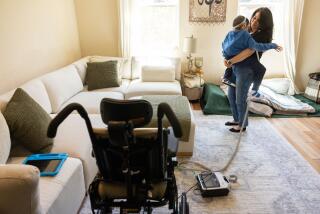Home Is Where Hearts and Helping Hands Are
On her first regular day with a new volunteer program, Margie Mayhams tied a denim apron over her white AARP T-shirt and went to work chopping onions and potatoes in the immaculate kitchen of a Carson couple who, until recently, had been strangers to her.
During her training to participate in the AARP’s Caregiving, Assistance, Respite, Education and Service program (CARES for short), Mayhams had learned to ask what help her elderly clients wanted most.
For Ervin Taylor, the answer was someone who could cook his favorite dish, smothered potatoes. For his wife, Joyce, it was an occasional respite from the caregiver role she has fulfilled in the 14 years since her husband suffered a stroke.
“I like doing this,” said Mayhams, a retired teacher who has cared both for her disabled husband -- for a year before his death -- and for her daughter, who had a stroke after chemotherapy several years ago. “It’s very rewarding.”
Mayhams is just the kind of person the AARP’s California chapter had in mind when it launched CARES to serve caregivers and their families.
The one-year pilot program recently began for families in Inglewood and Carson, with the goal of one day expanding throughout the state, according to Charee L. Gillins, spokeswoman for AARP California.
The organization’s own recent survey found that more than 80% of Americans 45 and older were involved some way in helping others without pay, and the state chapter wanted to harness that generosity to help the disabled elderly remain in their own homes.
The CARES program matches the skills and interests of volunteers with the needs of clients.
Volunteers help with home maintenance and repairs, cooking or grooming. Some troubleshoot home computers, help with letter writing or provide companionship for a few hours at a time.
Those with specialized skills, such as experience in plumbing or electrical work, can perform more complicated tasks, but program officials say anyone with the time and a desire to help is welcome.
One of the goals of the pilot project is to tap the talent for volunteerism among minorities, Gillins said. The survey found that older African Americans, for example, tend to work informally through their churches to help the needy.
DeClark Davis of Gardena said he would like to help with yard work and perform simple household tasks, such as changing lightbulbs.
He signed up to volunteer because “I needed something to keep me busy, and it seemed like a good thing to be of use to others.”
By the end of November, more than 60 people from the South Bay and beyond had volunteered; 30 of those had completed the required training and been matched with clients, Gillins said.
Volunteers are asked to make at least two visits per month for a minimum of three months. They can stay one to four hours on each visit.
The program “will mean everything,” said Ervin Taylor. Besides savoring his favorite dish, he will get manicures and hand massages from Mayhams, who worked in a beauty shop before earning her college degree and teaching credential. Taylor also plans to read aloud to her, which will help with his stroke rehabilitation.
And he knows that Mayhams’ company will give his wife some time for herself.
“We are so blessed,” said Joyce Taylor, recounting help the Taylors have received over the years from neighbors, friends, family and their church, “and now we have this. To have regular respite care is a first for us.”
The AARP program dovetails nicely with the city of Carson’s growing programs for the elderly and disabled, said Vickie J. Holt-Doby Jones, who coordinates the city’s seniors assisted-living program.
Carson recently began a respite program, using federal grant funds, that gives caregivers as much as 40 hours of time off from their round-the-clock duties of looking after disabled relatives.
“The AARP program will help us stretch those dollars even further” by adding its own volunteers, Holt-Doby Jones said. “A few hours’ break can make all the difference to a caregiver. Programs like this are really a godsend.”
She would get no argument on that point from the Taylors.
Although Mayhams lives just two blocks away in their quiet neighborhood of well-tended homes, they had not met before she joined the CARES program. They learned that Mayhams’ daughter is served by the same city-sponsored stroke rehabilitation center as Ervin Taylor, and soon they were chatting like old friends.
With the onion-covered potatoes simmering on the stove and sending a delicious smell wafting throughout the house, Mayhams moved into the living room to talk with Joyce Taylor and begin a manicure for her husband.
In the years since her husband fell ill, Joyce has become an expert at navigating the health care system and learning how to find the support services she and her husband need.
A Home Depot program built the wheelchair ramp to the front door, for example, and a nurse she befriended at a Kaiser Permanente hospital helped Taylor learn to care for her husband once he was well enough to go home.
But the CARES program added a whole new dimension.
“In 14 years,” she said, “we’ve never had anything like this.”
More information about CARES is available on AARP California’s Web site, www.aarp.org/ca.
Anyone interested in volunteering for the South Bay pilot program may call (310) 888-4021.
More to Read
Sign up for Essential California
The most important California stories and recommendations in your inbox every morning.
You may occasionally receive promotional content from the Los Angeles Times.










